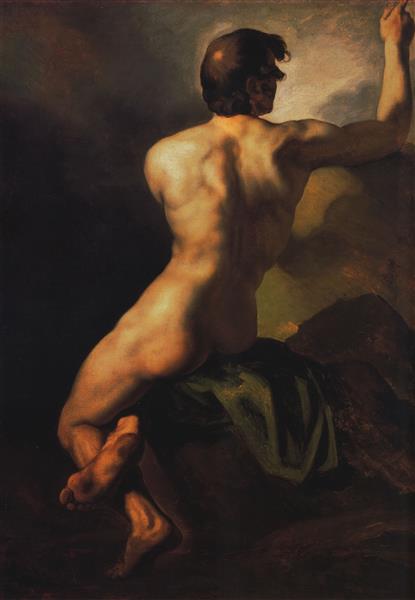Description
The work 'Académie' Male Seated and Seen from Behind, created by Théodore Géricault between 1812 and 1816, is a fundamental piece that encapsulates not only the artist's style, but also a significant moment in the evolution of academicism in painting. Géricault, known for his technical mastery and his exploration of human emotion through the figure, achieves with this work a representation that invites introspection.
In the composition, a man sits contemplatively, seen from the back. The choice of this angle is particularly interesting, as it offers an unusual perspective that avoids the familiarity of a frontal portrait. This decision, in addition to being aesthetically intriguing, suggests a sense of isolation and reflection, a recurring motif in Romanticism, of which Géricault is a notable precursor. The work not only captures a moment in the sitter's life, but also universalizes the human experience of introspection and vulnerability.
The use of color in 'Académie' is another aspect that stands out. The palette is made up of warm and neutral tones, evoking a feeling of warmth and humanity. The model's skin adapts to the nuances of light, revealing Géricault's exceptional ability to work with light and shadow, a technique that is evident in his famous work 'The Raft of the Medusa'. However, in 'Académie', the treatment of color also reflects a less grandiose, closer and accessible search, providing an intimacy that often escapes in more dramatic works.
It is interesting to note that the figure is devoid of ostentatious clothing or elaborate decorations, which highlights the nobility and dignity of the human figure in its simplicity. This can be interpreted as Géricault's statement about the essence of the human being, rather than his social status. The man is presented as an individual, rather than a symbol, which also aligns the work with trends towards more realistic representation of the figure rather than academic idealizations. The anatomy of the model, furthermore, shows Géricault's mastery over the study of the human body, emphasizing a naturalness that is both classical and romantic.
The fact that the painting is set between 1812 and 1816, a tumultuous period in French history, adds a layer of social and historical context to the work. Géricault, who had lived through the consequences of the Napoleonic Wars and the political change of his time, may have wanted to reflect in this image a deeper sense of humanity that transcends the events of the time. The characteristics of the figure, its posture and the care in the treatment of the skin, suggest that the artist was not only interested in the anatomy, but also in the psychology of the subject.
In conclusion, 'Académie' Male Seated and Seen from Behind is a work that speaks of the technical virtuosity and emotional depth of Théodore Géricault. His ability to capture the essence of the human being through a simple but powerful compositional approach, along with his treatment of color and figure, allow this work to resonate beyond its time. Offering an intimate view of the sitter, Géricault invites the viewer to reflect on their own humanity, a testament to art's enduring power to provoke introspection and empathy.
KUADROS ©, a famous painting on your wall.
Hand-made oil painting reproductions, with the quality of professional artists and the distinctive seal of KUADROS ©.
Playback service paintings with satisfaction guarantee. If you are not completely satisfied with your painting replica, we will refund your money 100%.

